Empiricism and the Problem of Metaphysics
Paul Studtmann
LEXINGTON BOOKS
A division of
ROWMAN & LITTLEFIELD PUBLISHERS, INC.
Lanham Boulder New York Toronto Plymouth, UK
Published by Lexington Books
A division of Rowman & Littlefield Publishers, Inc.
A wholly owned subsidiary of The Rowman & Littlefield Publishing Group, Inc.
4501 Forbes Boulevard, Suite 200, Lanham, Maryland 20706
www.lexingtonbooks.com
Estover Road
Plymouth PL6 7PY
United Kingdom
Copyright 2010 by Lexington Books
All rights reserved. No part of this book may be reproduced in any form or by any electronic or mechanical means, including information storage and retrieval systems, without written permission from the publisher, except by a reviewer who may quote passages in a review.
British Library Cataloguing in Publication Information Available
Library of Congress Cataloging-in-Publication Data
Studtmann, Paul, 1969
Empiricism and the problem of metaphysics / Paul Studtmann.
p. cm.
Includes bibliographical references (p. ) and index.
ISBN 978-0-7391-4255-4 (cloth : alk. paper) -- ISBN 978-0-7391-4257-8 (electronic)
1. Metaphysics. 2. Empiricism. I. Title.
BD111.S83 2010
110--dc22
2010028891
Printed in the United States of America
 TMThe paper used in this publication meets the minimum requirements of American National Standard for Information SciencesPermanence of Paper for Printed Library Materials, ANSI/NISO Z39.48-1992.
TMThe paper used in this publication meets the minimum requirements of American National Standard for Information SciencesPermanence of Paper for Printed Library Materials, ANSI/NISO Z39.48-1992.
Empiricism and the Problem of Metaphysics
To My Teachers
Contents
I would like to thank Graham Oddie, Christopher Shields, Philip Catton, Sean McKeever, Elizabeth Miller, and Rachel Singpurwalla for reading and commenting on parts of an early manuscript. I would like to thank an anonymous referee for providing detailed comments about the entire manuscript. And I would like to extend a special thanks to Rob Lovering, whose friendship, humor, and philosophical acumen made the writing of this book vastly more pleasant than it otherwise would have been.
One recurrent issue in the history of philosophical speculation has been the legitimacy of metaphysics as a theoretical discipline. As is well known, famous philosophers have endorsed opposite views with respect to this issue. On one side are those who have not only been optimistic about the possibility of metaphysical knowledge but who have endeavored to construct and justify various metaphysical theories; and on the other side are those who have denied any such possibility. It is safe to say that the former attitude was much more prevalent in the ancient and modern periods than it has been ever since. Plato and Aristotle, who are surely the greatest philosophers in the ancient world, both constructed what would now be called metaphysical theories, though they did not use the word metaphysics to refer to those theories. And the rationalists in the modern period are well known for their deeply metaphysical speculations. During the modern period, however, a skepticism about metaphysical knowledge began to unfold into the philosophical psyche. Hume presented the best-known critique of metaphysical theorizing from the modern period. And after Hume, a dominant question that has plagued philosophers has been the extent to which both philosophical knowledge in general and metaphysical knowledge in particular is possible.
The attempts since Hume to come to grips with the possibility of metaphysical knowledge represent some of the most interesting and influential episodes in the history of philosophy. Kant, for instance, self-consciously sought to place some a priori metaphysical knowledge (i.e., knowledge of the basic laws upon which physics and other empirical disciplines depend) on a firm theoretical footing, while at the same time putting other a priori metaphysical knowledge (i.e. knowledge of any supersensible realm) beyond our ken. Although his theoretical apparatus was never widely accepted, the influence of his transcendental framework on subsequent philosophical theorizing can hardly be overstated. And since Kant, some of the more influential philosophies, especially in the Anglo-American tradition, have been fueled by an increasing skepticism about metaphysical knowledge. Indeed, by the twentieth century, whole schools of philosophy were devoted to the dismantling of metaphysical speculation. The early Wittgenstein thought that metaphysical theses could not be asserted. The positivists endorsed a criterion of meaning that makes metaphysical assertions meaningless. Carnap tried to dismantle the import of ontological debates with his distinction between internal and external questions. And Quine, through a series of arguments concerning the analytic-synthetic distinction and other related topics, argued for a healthy skepticism about possibility of what he called first philosophy, which is another term often used to refer to metaphysics.
If one abstracts from the details of the various pro- and antimetaphysical theories in the history of philosophy and looks at metaphysical speculation from a sufficiently high perch, one will see a somewhat peculiarthough intellectually fascinatinglandscape. It is no doubt true that from a sociological perspective, the claim that metaphysics is a problematic discipline has in a sense already been settled. Although many philosophers still actively pursue metaphysics, and though their discussions have reached an impressive degree of sophistication, there isnt a single positive metaphysical thesis that has been established in anything close to a definitive way. Whereas the sciences have left us with a beautiful array of well-confirmed theories, metaphysicians really do, in Nietzsches words, look like albinos of the intellect. The resulting attitudes in the intellectual sphere reflect this fact. Whereas scientists and mathematicians are held up as the torch-bearers for intellectual progress, metaphysicians work in relative darkness, their theories and speculations hidden from all but the few who take the time and effort to learn the contours of their dimly lit debates.
Nonetheless, despite the prevailing sociological attitudes, metaphysics still presents a theoretically pressing problem. The interest of the problem can, in the first instance, be appreciated by noticing some obvious features of the sociological situation. Sociological factors, it should go without saying, are not only an imperfect guide to the truth, but also do not generally reveal the propter quid. They do not, in other words, reveal the underlying cause of what may nonetheless be a correct view. Hence, even if the prevailing attitudes about metaphysics are correct, there is still the question as to what, if anything, is wrong with metaphysical speculation. This question becomes all the more pressing in light of a simple response a metaphysician can make to the lack of success in metaphysics: progress has been slow because metaphysics is the conceptually deepest and hence most difficult discipline. This does not mean that progress cannot be made, but simply that we should not expect progress to be easy. Indeed, perhaps metaphysics in particular and philosophy in general is on the verge of a great theoretical flourishing. Kurt Gdel expressed just such an attitude when he said, Philosophy today, is, at best, at the point where Babylonian mathematics was.

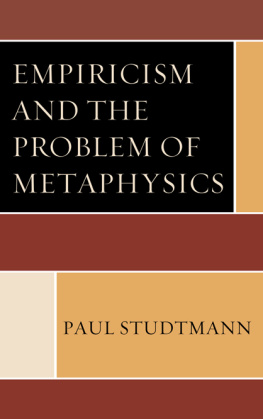

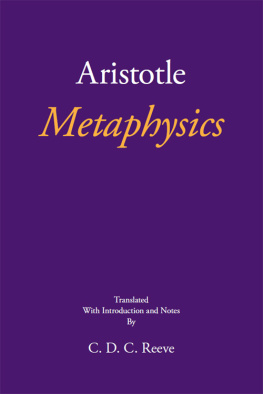


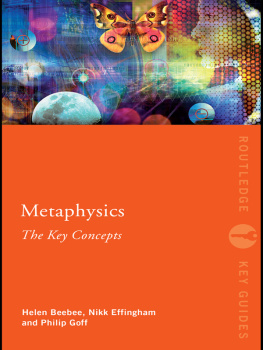
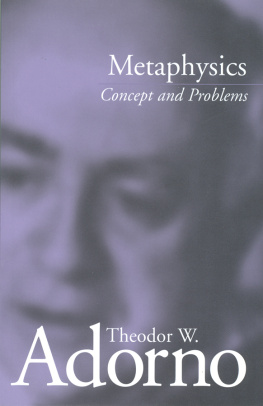
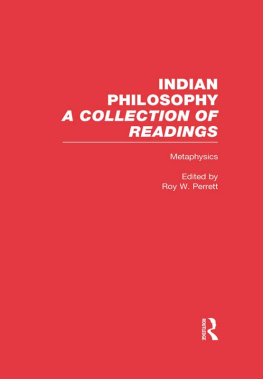
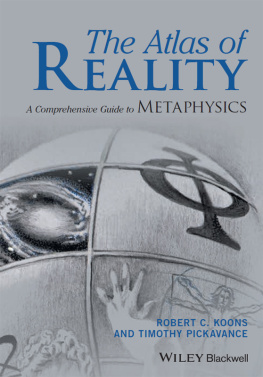
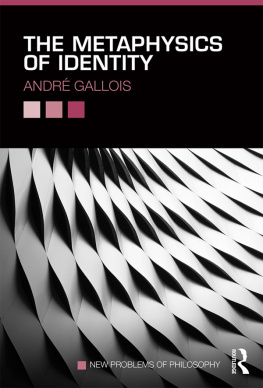


 TMThe paper used in this publication meets the minimum requirements of American National Standard for Information SciencesPermanence of Paper for Printed Library Materials, ANSI/NISO Z39.48-1992.
TMThe paper used in this publication meets the minimum requirements of American National Standard for Information SciencesPermanence of Paper for Printed Library Materials, ANSI/NISO Z39.48-1992.